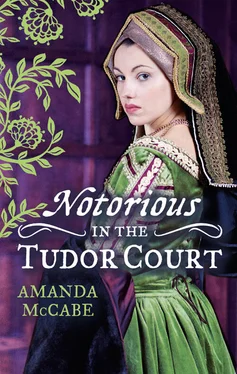When he came here, he was sure this would be the one place at Greenwich he could be alone, could sweat out his anger and frustration. Everyone else was in the banquet hall, feasting and drinking yet again. Including Marguerite.
At the thought of her, the mere breath of her name, Nicolai swung the racket harder, the “crack” as loud as a cannon. Yet still she would not be banished. That image of her, sprawled out on the theatre floor with her breasts bare, her hair spread around her, her legs open to him, smiling up at him as she welcomed him into her body—it was all still there. Burned into his memory, his senses. The way she smelled, of lilies and clean water. The smooth feel of her skin, satiny and warm.
The way her green eyes glittered, like the emerald she was named for, as she whispered his name.
Chert poberi! He did not trust her. What was the woman about? Did she try to kill him with sex now, as she could not with her dagger? If so, she was doing wondrously well.
He still hardly knew what had come over them there in the theatre. He had lusted for women before, of course, desired them with what he thought was overwhelming passion. He loved women, loved their laughter, their soft voices, the clean sweetness of them, the complex, mysterious ways their minds worked. And often they loved him back.
But never in his life had he felt anything like what happened with Marguerite Dumas. One moment he sparred with her, his muscles moving in the practised way he employed in so many fights before. To give in to anger was the kiss of death in swordplay, especially with an icy, untrustworthy opponent like the Emerald Lily.
But then the next minute it was as if his body was consumed by a great sun flare, his mind drugged, full of only her. Desperate need. Fully dressed, they copulated on the floor, their bodies bound together in a lust gone unfulfilled since Venice.
Yet why, then, did he still feel so very frustrated? So tied up in anger, tension?
He swooped up another hard leather ball from the bucket and slammed it against the wall. He imagined it was Marc Velazquez’s head, cursing his friend for sending him into this snakepit of a palace. A snakepit ruled by an emerald-eyed viper, as alluring as she was dangerous.
“I am too old for this,” he muttered.
“Oh, on the contrary,” Marguerite’s voice said from behind him, “only a man in the very prime of his life could wield a racket like that.”
He spun around to see her standing in the doorway, outlined by the torchlight. The dishevelled, flushed woman who had fled the theatre after their lovemaking was no longer to be seen. She was again an elegant lady of the French Court in her rosy-red silk gown, her silvery hair parted in the middle and swept back beneath a jewelled band.
But her eyes shimmered with the dark light of memory. Her hand was tense where she braced it against the doorframe. That thin, delicate cord grew tense in the air between them, taut and quivering.
Nicolai tossed aside the racket, swiping his sleeve over his damp brow. His hair clung to his neck. “How did you find me?”
“Dona Elena asked me to discover what had become of you, and one of the pages told me of the ‘mad Spaniard’ in the empty tennis court,” she said. “I did not take the time to explain the difference between Spain and Russia.”
He gave a rough laugh. “It would seem a pointless exercise. What did Dona Elena want?”
“She was worried about you, and did not believe your excuses to avoid the banquet.”
“She is surrounded by her attendants. I’m sure she can do without me for an hour. I will join her for the pageant after.”
“’Tis true that King Henry’s banquets seem to last far past the point where they are amusing,” Marguerite said, taking a step closer. Her hands clasped at the fine fabric of her skirts, and she seemed uncharacteristically hesitant. “But I think she was concerned you might be ill.”
He grinned at her. “I have never felt better, thanks to you, mademoiselle. ”
She laughed, ducking her chin so her face was cast half in shadows. “I was glad of the excuse to escape the feast. All that noise, the stares…”
“The stares of your companion, the priest?” Nicolai said, remembering the thin, pale cleric who seemed to be her Court shadow.
“Father Pierre, yes. He is always warning me to beware of spending too much time with the Spanish. He says you are all not as you seem.”
“That seems a pointless warning to someone like you.”
Her head tilted quizzically. “Someone like me?”
“Someone who lives at Court.”
“Hmm, yes. Surely your own life as a travelling player has prepared you well to be a courtier.”
“The ability to pretend to be someone we are not is useful anywhere. To be able to shift and change whenever we desire.”
“To deceive,” she murmured.
Nicolai moved closer to her, reaching out to gently take her chin in his hand, lifting her face toward him, into the light. The shadows played over her fair skin, the slant of her cheekbones. She stared up at him solemnly, giving nothing away.
Yet she trembled under his touch, like a tiny captive bird trying to escape.
“Who are you, really?” he said softly. “I called you a fairy enchantress, a witch, and so you seem to be.”
“I could not tell you.”
“Because you do not trust me?”
She reached up to take his fingers in hers, bending her head to press a kiss to them. It was a soft, gentle salute, strangely sad. “Because I do not know.”
She let him go, stepping back, easing away from him, from their situation. “I have to go back. I will tell Dona Elena you are well, and will see her at the pageant.”
Then she spun around and dashed away, leaving her lily scent, and her cryptic words, heavy in the air. Nicolai followed to the doorway, watching after her as she hurried into the night, a shimmering, silken figure, like the fairy he called her. She vanished not into some enchanted, misty realm, but into the well-lit, noisy banquet hall. Into her courtiers’ life.
As Nicolai stared after her, a tall, thin shadow detached itself from the night and trailed behind her. An ominous crow flocking after the bright, trembling bird. Father Pierre.
So, Marguerite was far from the only French person with secrets tonight.
Marguerite sat on her clothes chest, her body erect, tense, as she listened to the palace around her. It was deep into the darkest part of the night, the sky outside her little window a purplish indigo. Almost everyone tucked inside Greenwich’s stout walls slept. Claudine’s chamber next door was silent.
But Marguerite could not sleep, could not even lie down on her turned-back bed. She was too restless, every sense humming with acute awareness of the world around her.
What had she meant when she told Nicolai she could not tell him who she was, because she did not know? Of course she knew who she was! She was Marguerite Dumas, the Emerald Lily. Faithful servant of France. Dependent on no one as she made her way through the world. It was all she had worked for, all she had wanted since she was fifteen years old.
Yet when she was near Nicolai, all that vanished. Her world shifted, cracked, reformed into something new and strange, something she did not recognise. When she was near him, these restless longings for she knew not what overwhelmed her.
And she did not know who she was.
Marguerite rose from the chest, drifting toward the looking glass. She wore only a sleeveless sleeping chemise, as thin and light as cobwebs, her hair loose over her shoulders. The glow from the one candle shone through the fine fabric, revealing the slender lines of her body, the high, erect, pink circles of her nipples. She was all white and silver, like a ghost in the night.
Читать дальше












